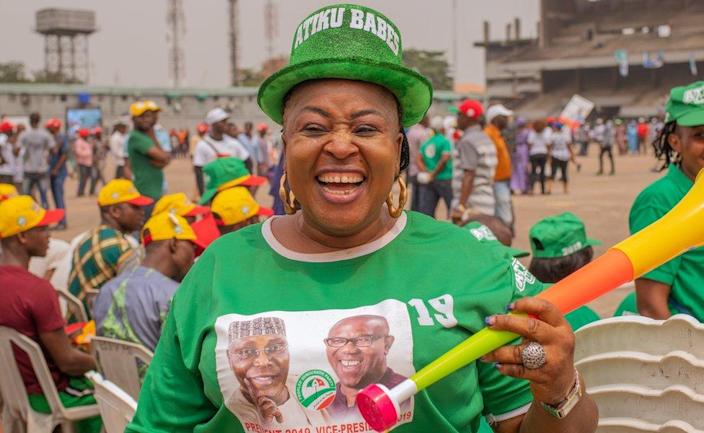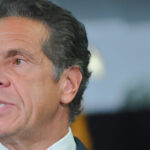
In our series of letters from African writers, Nigerian novelist Adaobi Tricia Nwaubani looks ahead to what her country’s election build-up will bring.


Nigeria’s T-shirt printers, jingle writers and advertisers are in for a bumper season with the country gearing up for the polls – 12 months away.
As candidates begin to emerge for the presidency, as well as thousands of other positions, here is a handy guide to five things to look out for:
1) ‘Stomach infrastructure’
Bags of rice, bales of cloth and bundles of cash will be distributed to the electorate by grovelling candidates keen to curry favour.
Known in Nigerian political parlance as “stomach infrastructure”, these gifts will offer a diversion from questions about policies and promises.
They will be used by sitting officials or parties to compensate for their failure to provide actual infrastructure like transport and power.
They will be seen by the electorate as advance compensation in case a candidate fails to fulfil their promises after being elected.
2) Greatness thrust upon one
Self-deprecation is not a common Nigerian trait, but for some reason many politicians here seem shy to express their enthusiasm to contest.
Nothing like: “I’ve wanted to be president of Nigeria since I was 12.” Instead, political hopefuls must be seen to have greatness thrust upon them, their ambition pushed by their kinsfolk.
There they were sitting under the mango tree when members of their ancestral community approached them to say: “We want you to go for us. Nobody else but you, please.”
Be prepared to see different groups of people paying visits to politicians and beseeching them to contest. Be prepared to hear many politicians say “no” at least thrice, before finally yielding a reluctant: “Yes, I will go. But only because you asked.”
These visits will be widely covered by TV news programmes, and the conversations reported in newspapers.
3) The female candidate
She will spark an international media frenzy with journalists from across the developed world scrambling for interviews with her.
Lengthy profiles will describe her as “brave” for daring to try and take a job that has in Nigeria always been held by a man.
She will be hailed as an inspiration to women and girls.
An international microphone constantly beneath her chin, she will share her many views, on everything from marriage to feminism to, of course, girl-child education.
Usually better educated and enlightened than the typical male candidate, she will produce Twitter-ready quotes and powerful sound bites.


Women’s rights activists and feminist groups will rally around her, their boisterous backing prompting heated conversations on social media about why more women must support other women.
She will be registered with a party that no-one had ever heard of before. Most likely, it will be formed just the other day, and enrol no other members beyond her direct staff.
Many Nigerians will expect her to disappear after the political pageant is over, to never again see or hear anything about her active involvement in politics.
4) Internet warriors
This will be a good year for those jobless young men and women who are paid to go online and influence conversations.
Their personal opinion on any topic is irrelevant. For a fee, they will like, love, re-tweet and re-post, and be prepared to distort any conversation in the direction that their politician client instructs.
The more accounts each of them can register in different names, the merrier.


While this may be a job for the jobless, it is certainly not one for the lazy. It requires dedication and commitment.
Day and night, they will be on standby to attack, troll, praise and extol. Never relinquishing their hold on public discourse, they will work hard to ensure that certain names and topics trend.
5) Crystal-ball ‘failures’
International media organisations will apportion generous word counts and screen time to their coverage of Nigeria.
Foreign commentators and pundits claiming to be experts on Nigerian affairs will emerge from every nook and cranny, making confident predictions about everything from the outcome of the elections to the post-President Muhammadu Buhari era.
But they will rely on common sense, ignorant of the fact that Nigeria is one of those places where few things make sense. As we say here: “The more you look, the less you see.”
Some of the experts will base their predictions on Twitter trends, not realising that the loud voices on the social media platform are not always representative.
The majority of Nigeria’s more than 200 million people living in the country cannot afford the data costs needed to tweet, and a good number of the comments from Nigerians on Twitter come from the diaspora.
The international crystal-ball gazers will be misled.
More Letters from Africa:
Follow us on Twitter @BBCAfrica, on Facebook at BBC Africa or on Instagram at bbcafrica






